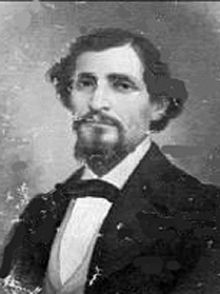
This is a list of operas by Mexican composers.[1] Many, but not all, of them premiered in Mexico. Amongst the operas which had their first performances abroad are Melesio Morales' Ildegonda (Italy, 1868), Daniel Catán's Florencia en el Amazonas (USA, 1996), and Julio Estrada's Murmullos del páramo (Spain, 2006).

Mexico boasts several professional opera companies, including the National Opera Company (Compañía Nacional de Ópera) and the Opera de Bellas Artes, both based in Mexico City. The International Cervantino Festival in Guanajuato, for example, features opera performances alongside theater, dance, and music. In addition to the Palacio de Bellas Artes, Mexico is home to other notable opera houses, such as the Teatro Degollado in Guadalajara and the Teatro de la Ciudad Esperanza Iris in Mexico City.

Many of the operas listed have librettos in Spanish, the official language of Mexico. However, the practice of using French or Italian librettos was common in 19th and early 20th century Mexico when much of the opera in that country was performed by visiting troupes largely composed of European singers unaccustomed to singing in Spanish. Both Gustavo Campa's Le roi poete and Ricardo Castro Herrera's La légende de Rudel had French librettos,[2] while Catalina de Guisa by Cenobio Paniagua and several other notable operas of this period had Italian librettos.[3] Although the vast majority of later Mexican operas have Spanish librettos, there have been 20th century works set to English texts, most notably The visitors by Carlos Chávez with a libretto by the American poet Chester Kallman.
Opera was brought to Mexico during the colonial era by Spanish missionaries and settlers. The first documented opera performance in Mexico took place in 1701 in Mexico City. The first opera by a Mexican-born composer was Manuel de Zumaya's La Parténope, performed in 1711 before a private audience in the Viceroy's Palace in Mexico City.[4] However, the first Mexican composer to have his operas publicly staged was Manuel Arenzana, the maestro de capilla at Puebla Cathedral from 1792 to 1821.[5] He is known to have written at least two works performed during the 1805/1806 season at the Teatro Coliseo in Mexico City – El extrangero and Los dos ribales en amore. Both were short comic pieces.[6] The first Mexican opera seria was Paniagua's Catalina de Guisa (composed in 1845 and premiered in 1859).
With its story about the Huguenots in France and an Italian libretto by Felice Romani, contemporary critics noted that the only thing Mexican about it was the composer.[7][8] Although the traditions of European opera and especially Italian opera had initially dominated the Mexican music conservatories and strongly influenced native opera composers (in both style and subject matter), elements of Mexican nationalism had already appeared by the latter part of the 19th century with operas such as Aniceto Ortega del Villar's 1871 Guatimotzin, a romanticised account of the defense of Mexico by its last Aztec ruler, Cuauhtémoc. Later works such as Miguel Bernal Jiménez's 1941 Tata Vasco (based on the life of Vasco de Quiroga, the first bishop of Michoacán) incorporated native melodies into the score.[7]
- ^ The list also includes the operatic subgenre of zarzuela, but rock operas
- ^ The French libretto of La légende de Rudel was translated into Italian for its first performance
- ^ Standish, Peter, A Companion to Mexican Studies Archived 10 May 2017 at the Wayback Machine, Boydell & Brewer Ltd, 2006, pp. 69–70. ISBN 1-85566-134-9
- ^ Cite error: The named reference
Grove Zumayawas invoked but never defined (see the help page). - ^ Tiemstra, Suzanne Spicer (1992). The Choral Music of Latin America: A Guide to Compositions and Research. Greenwood Publishing Group. p. 8. ISBN 978-0-313-28208-9. Archived from the original on 23 April 2018. Retrieved 21 March 2020.
- ^ Catalyne, Alice Ray (2001). "Arenzana, Manuel". In Sadie, Stanley; Tyrrell, John (eds.). The New Grove Dictionary of Music and Musicians (2nd ed.). London: Macmillan Publishers. ISBN 978-1-56159-239-5.
- ^ a b Grout, Donald Jay and Williams, Hermine Weigel, A short history of opera Archived 10 May 2017 at the Wayback Machine, Columbia University Press, 2003, p. 561. ISBN 0-231-11958-5
- ^ Bethell, Leslie, The Cambridge History of Latin America Archived 10 May 2017 at the Wayback Machine, Volume 4, Cambridge University Press, 1984, p. 469. ISBN 0-521-23225-2